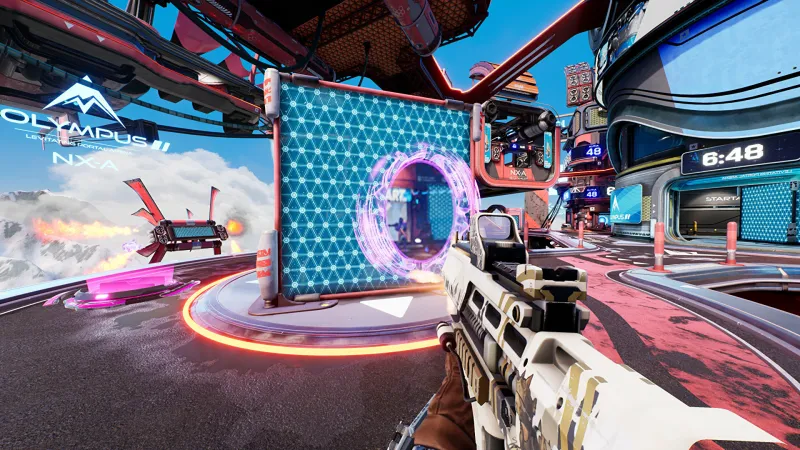Splitgate Game Free Download

The Evolution of PC Gaming: From Pixels to Virtual Worlds
Introduction
PC gaming has come a long way from its humble beginnings. What started as simple pixelated adventures has transformed into an industry filled with cinematic storytelling, realistic graphics, and immersive experiences. Over the past few decades, the PC has become one of the most versatile platforms for gamers worldwide, offering titles that range from casual indie projects to massive AAA blockbusters. In this article, we’ll explore the journey of PC gaming, from the early days of floppy disks to today’s era of cloud-based gaming.
The Early Days of PC Gaming
In the 1980s, PC games were limited in both graphics and gameplay. Titles like Prince of Persia and Wolfenstein 3D introduced players to the idea that home computers could be powerful gaming devices. These games ran on simple operating systems like MS-DOS and used floppy disks for distribution. Despite hardware limitations, developers pushed boundaries to create experiences that felt groundbreaking at the time. The early PC gaming community was small but passionate, laying the foundation for what would become a massive industry.
The Rise of 3D Graphics
By the mid-1990s, PC gaming experienced a major leap with the introduction of 3D graphics. Games such as Quake and Tomb Raider brought new levels of immersion, making players feel like they were stepping into another world. Graphics cards like NVIDIA’s RIVA TNT and 3dfx’s Voodoo series changed the way games were developed and played. Multiplayer gaming also began to take off, with LAN parties becoming popular among friends who wanted to experience competitive gameplay together. This period was crucial in shaping the PC as a platform for innovation.
Online Gaming Takes Over
The late 1990s and early 2000s marked the beginning of the online gaming revolution. With faster internet connections, players could compete and cooperate with others around the world. Games like Counter-Strike, Diablo II, and World of Warcraft became cultural phenomena. Online gaming not only connected players but also helped form communities, clans, and esports leagues. For many, PC gaming became less about playing alone and more about engaging with others in persistent online worlds.
The Golden Age of PC Strategy Games
While consoles were focused on action and adventure, the PC became the home of strategy titles. Games like Age of Empires II, Civilization III, and StarCraft dominated the scene. These games required careful planning, resource management, and tactical thinking. Unlike console gaming, which often emphasized quick reflexes, PC strategy games encouraged players to think critically and develop long-term strategies. Even today, strategy gaming remains a beloved genre among PC enthusiasts.
The Role of Mods and Custom Content
One of the biggest advantages of PC gaming has always been modding. Players have the freedom to create custom content, from new maps and characters to entirely new game modes. The Half-Life modding community gave birth to legendary titles like Counter-Strike and Dota. Similarly, The Elder Scrolls V: Skyrim has been kept alive for over a decade thanks to thousands of mods created by fans. This culture of customization is unique to PC gaming and adds a level of creativity and longevity unmatched by consoles.
Indie Games and the Steam Revolution
The mid-2000s brought about the rise of indie games. Platforms like Steam made it easier for small developers to publish and distribute their work. Titles like Minecraft, Undertale, and Stardew Valley proved that creativity and storytelling could triumph over massive budgets. Steam’s marketplace also helped democratize PC gaming, allowing players to discover hidden gems alongside AAA blockbusters. This shift empowered independent creators and gave players a wider range of experiences than ever before.
The Growth of Esports
Esports has become one of the most significant developments in modern PC gaming. Titles like League of Legends, Dota 2, and Counter-Strike: Global Offensive have created global tournaments with multi-million-dollar prize pools. Professional gamers have become celebrities, and esports arenas fill with fans eager to watch live competitions. The rise of platforms like Twitch further amplified this growth, allowing anyone to stream or watch competitive gaming online. Esports has transformed PC gaming into a professional sport, attracting sponsors, advertisers, and mainstream attention.
Modern Graphics and Immersive Experiences
Today’s PC games boast visuals that rival Hollywood movies. With technologies like ray tracing, 4K resolution, and realistic physics engines, developers can create worlds that feel alive. Games such as Cyberpunk 2077, Elden Ring, and Microsoft Flight Simulator demonstrate just how far graphics technology has come. Paired with powerful gaming rigs and VR headsets, players can experience a level of immersion that was once unimaginable. The PC remains the ultimate platform for those who want the best performance and visual fidelity.
The Future of PC Gaming
Looking ahead, the future of PC gaming is incredibly exciting. Cloud gaming services like NVIDIA GeForce Now and Xbox Game Pass for PC are making high-quality games accessible to players without expensive hardware. Virtual reality and augmented reality continue to evolve, offering new ways to experience games. Artificial intelligence is also playing a role, enhancing everything from NPC behavior to game design. With constant innovation, PC gaming is set to remain the leading platform for interactive entertainment.